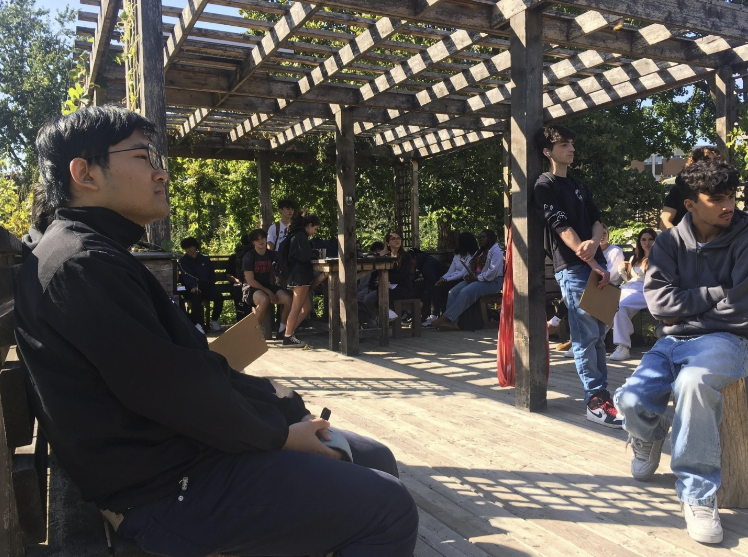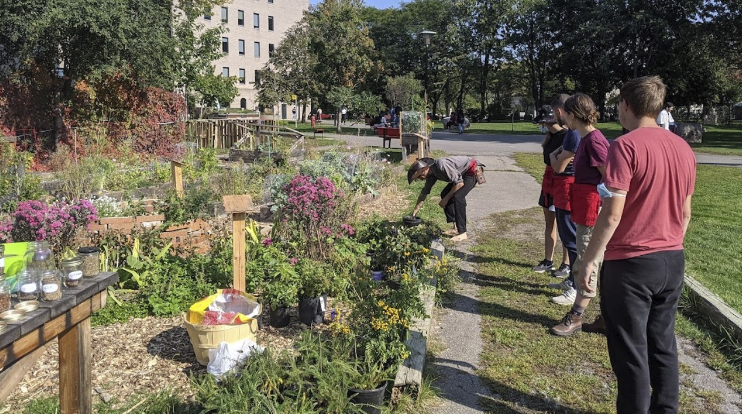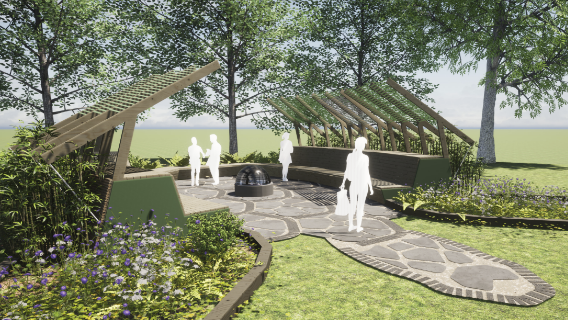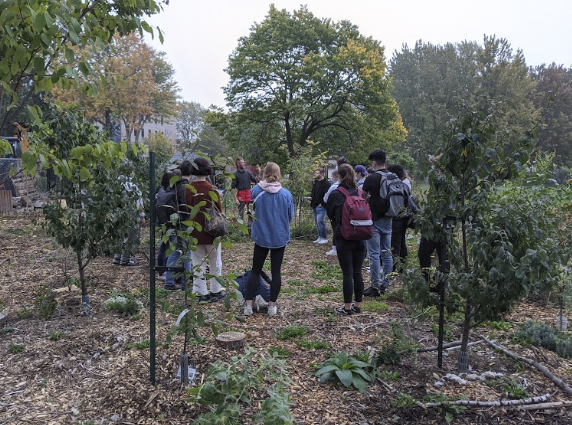The Vanier Gardens, which have seen a lot of development in the last few years, offer a truly unique pedagogical space. As far as we are aware, we are the only CEGEP without an attached horticultural program employing a dedicated garden technician. In this article, we share our vision for the integration of sustainability into the college’s educational fabric. We give examples of pedagogical projects that we have designed and facilitated over the years, including a virtual visit that is accessible anytime, rain or shine! Through ongoing collaborations and projects with teachers, we aspire to foster a lasting culture of sustainability on our campus and hope that our story will inspire others to do the same!
The Vanier Gardens: A Pedagogical Space That’s Alive!
Contents
A bit of history…
The Vanier Gardens, dating back to 2008, were started by Evelynne Barten as a few areas around the campus, planted and maintained by Evelynne and her Environmental and Wildlife Management students. In 2014, Alena Perout, a geography teacher and now Dean of the Faculty of Arts, Business, and Social Sciences and International Education, led the official Garden Groundbreaking along with Richard Dugas, the Sustainability Officer at the time. Initially, the Gardens were a small area in front of the college where teachers and students volunteered their time. This initiative aimed to introduce urban agriculture to a diverse student population, some of whom came from low-income backgrounds and lacked access to land.
Myriam Mansour, a geography teacher and key figure in the project, joined in 2015 and received institutional support in 2016, eventually securing a Canada Summer Jobs Grant to hire a student to tend to the gardens during the summer. While the project now offers remunerated employment to at least 2 students every summer thanks to Canada Summer Jobs, it is also a great on-campus volunteering opportunity for students as it relies on a pool of student volunteers for its maintenance during the school year. The gardens also became a space for hosting classes coming from Geography, English, French, and Humanities, among others. In 2017, the gardens were relocated.
That same year, a group composed of 3 teachers and a pedagogical counsellor received an Entente Canada Quebec (ECQ) grant for the Vanier Collective Gardens Community (VCGC) Project. The aim of the project was to create inclusive and social spaces through garden-related activities and workshops. Thanks to this project, a pergola was installed in the gardens during the summer of 2019, expanding its usability and providing an outdoor classroom space. Meanwhile, Mark Reynolds, who has expertise in gardening, herbalism and permaculture, was involved in workshops and class projects at Vanier. His involvement gradually grew, leading to an extended contract in the summer of 2019.
Recognizing the demanding nature of the project, Rosemarie Brodeur and Andrea Iftimie took over from Myriam as co-coordinators of the gardens in the fall of 2019. The team continued to explore opportunities to expand the gardens’ offerings. Seizing the opportunity offered through a project to plant 50 trees for Vanier’s 50th anniversary, we added 20 fruit and nut trees to the grounds beside the pergola. This led to the introduction of the concept of a “food forest,” planting fruit trees and other edible species to create a permaculture-inspired ecosystem. To fund these developments, we actively pursued grants, which played a crucial role in the project’s growth.
In the fall of 2020, following the addition of Isabelle Rivest as co-coordinator in replacement of Andrea Iftimie, we secured a Tree Canada grant, enabling the planting of additional trees and shrubs for the food forest. The project aimed to create a substantial outdoor learning space within the college campus.
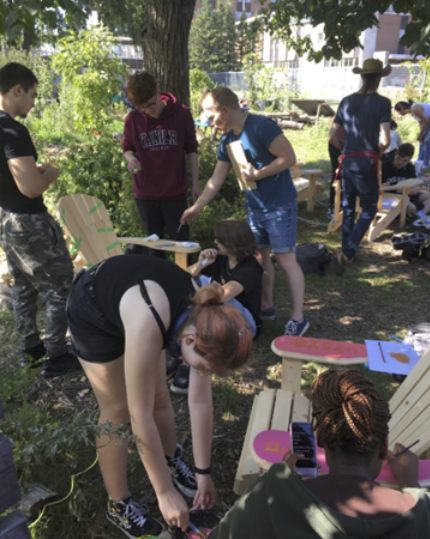
A group of students working on an Art History project that involved painting 15 new Adirondack chairs for the gardens in the Food Forest.
Recognizing the need for more institutional support to ensure sustainable growth for the project, we decided to transform the gardens into a dedicated learning lab. We sought to demonstrate that experiential learning could take place in outdoor spaces for any program, which led to the submission of a new ECQ grant.
The gardens had already served as an outdoor classroom, primarily for General Education classes. Mark conducted tours, discussing urban agriculture, traditional gardening, and permaculture. Students were actively engaged, participating in various gardening activities.
Several teachers began incorporating the gardens into their classes, assigning projects such as writing poems, reflecting on the importance of getting involved on campus for increased academic success, or researching plants found in the gardens. These initiatives demonstrated the potential of the gardens as a pedagogical tool and helped build connections between the gardens and different subject areas.
Despite challenges, including the COVID-19 pandemic restricting access to the gardens, we sought ways to make the gardens more accessible. This new ECQ project aimed to address these challenges and enhance institutional support for the gardens’ educational mission.
Presentation video of the Vanier Gardens
Fertilizing the gardens with pedagogy
Pre-ECQ
When the current team took over in the fall of 2019, the objective was to upgrade the current gardens to include new spaces for urban agriculture, food production and education. We set up some goals for ourselves, including building a physical space that would support endless pedagogical possibilities. It took us 3 years to build the food forest and to integrate the pergola into the garden space. As this grounds work was happening, we were also hosting classes and collecting feedback from teachers, who were expressing more specific needs pertaining to activities happening in the gardens. For example, some of them would outline their curriculum and Mark, in his multifaceted role as a lab technician, gardener, groundskeeper, and pedagogical counsellor, would collaborate with them directly to create new and engaging teaching activities.
Post-ECQ
With the ECQ initiative, our aim was to formalize the process of integrating classes into the gardens, aligning it with specific competencies. Our overarching objective was to ensure that as many Vanier students as possible experienced the gardens during their time at the college.
To achieve this, we established a committee of teachers dedicated to creating garden-based activities. This 2-year project involved one teacher from Social Science (Rosemarie Brodeur) and one from Science (Lissiene Neiva), both developing activities for introductory courses during the 1st year.
Rosemarie designed an activity for history to be integrated to the new Introduction to World History, the mandatory course replacing History of Western Civilizations in the revised Social Science program. The goal of the activity was to introduce the students to the concept of the Columbian Exchange while focussing on the exchange of foods and the impacts that had around the world, and more specifically on the Indigenous peoples that would have been living around Montreal at the time of first contact.
In parallel, Lissiene created an activity for biology, focusing on local ecology and tailored for an introductory biology course. In this activity, students explored the gardens, examining various species and collecting data for later use in creating a food web.
During the fall, we collaborated on refining these activities with the help of David Hoida, the coordinator of the Pedagogical Support and Innovation office, who was a pedagogical counsellor at the time. Together, we devised the history and biology activities, which we then proposed to our respective colleagues. Our intention was to have these activities integrated into the course frameworks, aligning with program revisions in Social Science and Science. This approach aimed to ensure broader exposure for students to the gardens and a consistent role for the gardens in the college’s educational mission.
Following approval in the winter, the activities were implemented in classes. We gathered feedback from students and teachers, and made minor adjustments to improve the experience. Importantly, this ECQ initiative also contributed to securing Mark’s permanent position.
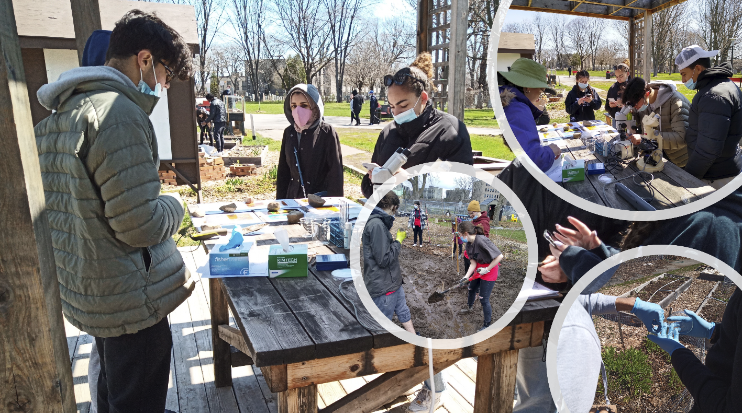
A group of students examine biodiversity, species interactions, food webs and experimental design as part of their biology class.
During the 2nd year, 2 additional teachers joined the committee to create activities for upper-level courses. Nirmala Bains, for the Social Science program, developed an activity for the Current Issues in Anthropology course. During that activity, the uses of commonly known weeds in medicine and food were explored. Students learned to identify and utilize these plants during walks, creating a full sensory experience. Activities included making pesto from dandelion flowers and leaves. Stephane Bourget, for the Science program, created an activity for Electricity & Magnetism, a physics course, in which students set up experiments to investigate how to best tap into the energy of the earth to produce an electrical current using different garden soils.
Taking a rain (or snow!) check
To address rainy days, Mark explored virtual reality platforms and online tools. This innovation allowed us to offer garden experiences even during inclement weather. We presented this virtual version at the AQPC symposium in June 2023.
An interactive presentation of the gardens including virtual reality content
When teachers book a class, we maintain contract. If it’s raining, we communicate and adapt accordingly. For example, on a moderately clear day, Mark might start the class indoors and transition outdoors for a portion, provided students are appropriately dressed for the weather.
Our activities are seasonally scheduled. During the summer, Mark is present to tend to the gardens and train the summer garden team, financed through Canada Summer Jobs. In the winter, he takes a vacation. He returns in mid-February to prepare for the upcoming season, with a window of opportunity typically in April and early May for outdoor classes. The other window falls between mid-August and early November, providing the best weather and fewer exam conflicts. Outside these windows, we conduct workshops, participate in ped days, host events, and attend to administrative tasks. During the summer, we still offer classes but on a smaller scale.
For the history activity during the winter semester, we use the virtual reality version mentioned earlier. This ensures that even in inclement weather, students can engage with the gardens.
In the case of biology, if outdoor conditions are unfavourable, Mark delivers a video lecture, demonstrating respectful species exploration. Students then have the responsibility of visiting the gardens independently to complete their assignment. This hybrid approach allows flexibility in scheduling and ensures that students still benefit from garden experiences, even when Mark is not physically present.
Examples of projects involving the gardens in other courses and programs
Within the Environmental and Wildlife Management program, students conduct studies on pollinators and participate in planting gardens as part of their Plant Life course. Learning to propagate and divide perennials, they contribute to the creation of pollinator gardens on campus, with plans for expansion in upcoming semesters.
Our Early Childhood Education program involves weekly interactions with young children in the gardens. We’ve also established a partnership with a local daycare, hosting around 100 children who engage with the gardens. Additionally, we collaborate with the technical program, incorporating garden-related activities into their curriculum.
The Explorations program (also known as Springboard) emphasizes volunteerism and campus involvement to enhance academic performance. As part of the Education and Career Planning course, students visit the gardens for tours and various activities, which cater to a wide range of preferences and abilities. We also train students during the semester to assist with garden management and maintenance. This approach not only supports our garden’s needs but also equips students with valuable skills for their future careers.
The gardens keep growing
We’ve witnessed significant growth in garden visits, with a doubling of visits last semester and more than double the visits again this semester. This exponential growth underscores the success and popularity of our garden-based pedagogy, motivating us to expand our efforts and continue fostering outdoor experiential learning.
In the fall, we expanded the implementation of our garden-based activities. Initially, the history activity was conducted in 7 sections with 3 different teachers, while the biology activity involved 4 teachers and 6 sections in the winter semester. Eventually, all biology teachers adopted the activity after an introduction session. In contrast, about 50% of history teachers integrated the activity, with some adjustments made to the lab framework to accommodate their needs.
Posters promoting different pedagogical activities and workshops (co-)hosted by the Vanier Gardens team
dsds
Future vision and initiatives
We are excited to share our future plans and initiatives, including a substantial expansion of our gardens. In collaboration with the Indigenous Student Centre and local Indigenous consultants, we are launching the Indigenous Learning Circle Garden. This remarkable space will feature an amphitheatre-style seating arrangement with benches for 40 students, designed in the shape of a turtle. The garden will serve as a cultural and educational hub for both Indigenous and non-Indigenous students. We intend to host ceremonies, festivals, celebrations, and guest speakers while incorporating Indigenous teachings and cultures within this unique setting. Surrounding the amphitheatre, we will create new gardens as the flippers of the turtle, enhancing the overall experience.
This ambitious project has begun construction in Fall 2023, marking a significant step in our 5-year plan. Our plan primarily aims to bolster the sustainability efforts on campus and ensure their long-term viability. Over time, our efforts have grown significantly, and we’ve reached a stage where we must secure ongoing support for our initiatives.
Additionally, we are actively managing various zones across the campus that were transformed from monotonous grass expanses into vibrant green spaces. These areas, expertly maintained by Mark, now contribute to the ecological diversity of our campus. Notably, we have a willow structure that acts as a meditation garden, which complements the Indigenous Garden.
Reflecting on our past accomplishments, it is evident that we have exceeded our own expectations since 2020. Nevertheless, we acknowledge areas that warrant further attention, with community relations being a key focus. Our interactions with other colleges, such as John Abbott College, have been productive, featuring collaborative workshops and projects. For instance, we recently conducted a workshop for John Abbott teachers, contributing to their pedagogical approach through nature integration.
What sets our position apart is the unique blend of permaculture initiatives within a college setting that isn’t primarily focused on agriculture. Looking forward, we aim to continue nurturing collaborations and encouraging teachers to explore pedagogical projects involving the gardens. Recently, we facilitated a project proposal for French teachers who are developing a sustainability-focused toolbox for their courses. This initiative will provide pedagogical materials and activities, including visits to our gardens, catering to various proficiency levels.
What’s next
Our project aims to foster external community relations, as evidenced by our collaborations with a local daycare, John Abbott College, and the West Montreal Rehabilitation Centre. These partnerships have allowed us to involve people with disabilities, such as those with Down syndrome, in garden activities. For instance, they recently participated in making tea bags and mulching trees, illustrating our commitment to community engagement.
A key component of our 5-year plan is to strengthen these connections, enhancing our project’s outreach and impact. Additionally, we are exploring opportunities to collaborate with on-site psychologists, therapists, and student services. Our goal is to leverage the garden’s resources, like camomile, to support student well-being, particularly during stressful periods such as exams. By providing herbal remedies, we aim to aid in stress management and mental focus.
However, our challenge lies not in the lack of ideas, but in the constraints of time and resources. Despite these limitations, our focus remains on building meaningful partnerships and utilizing our garden as a tool for community engagement and student support.
Our motivations and inspirations
Mark
My motivation for this project stems from a desire to reconnect with nature and provide students with the same opportunity. Although my academic background is in economics and banking, a decade after graduating, I realized my true passion lies elsewhere. This revelation harkens back to my childhood experiences in a garden, sparking a desire to raise awareness about our natural environment.
My goal is to facilitate a deeper connection with nature, helping students understand where our food comes from and the various paths to engaging with the natural world, be it through ink, fabrics, or food flavours.
As a herbalist, I find joy in introducing students to unique plants like spilanthes. This herb, though small, has a dramatic effect when chewed, causing numbness and increased salivation, illustrating its medicinal properties. Such experiences weren’t part of my education until I was 27, which underscores the importance of exposing students to these aspects of nature.
I’m motivated by the tangible impact of the gardens, visible from my window, enhancing the campus’s beauty and serving as a communal space.
Rosemarie
The community aspect of our garden project is a key motivator. It provides a unique space for socialization and interaction beyond traditional settings. For instance, faculty members from various departments have participated in activities like preparing herbal tea and salads using garden produce. These experiences promote unity and offer an alternative to standard meetings.
Additionally, we engage in team-building activities for different services, like the Human Resources department who attended a gardening workshop in the gardens last June. This not only beautifies the campus and help us maintain the Lab, but also fosters a sense of ownership and connection to the environment.
Our approach to engaging teachers and students is dynamic. We participate in volunteering fairs and set up promotional tables in the cafeteria, offering teas and pesto tastings. This hands-on interaction, including activities like making tea bags, is not only educational but also therapeutic.
The project extends beyond academic boundaries, connecting me with people from all areas of the college. This interaction has broadened my college community, breaking the typical teacher bubble and creating a more inclusive and interconnected environment.
In a (sustainable) nutshell
Over the years, we have recognized the multifaceted impact of our garden projects on college life. These projects extend beyond mere physical spaces, significantly influencing various aspects of campus dynamics. The success of these initiatives is largely attributed to the collaborative synergy of the team. Our complementary skills, combined with support from the college administration, have been crucial in maximizing the garden’s potential.
Our journey began in 2019, building upon a decade of foundational work. This historical context has been favourable, particularly with the growing openness of educational institutions toward innovative pedagogies and a heightened focus on sustainability.
Moreover, the post-pandemic landscape has further elevated the importance of outdoor spaces. Encouraging outdoor activities has not only increased engagement with our gardens but has also highlighted their educational and communal benefits.
In summary, the success of our garden initiatives is a blend of strategic alignment with institutional goals, effective team dynamics, and timely responsiveness to evolving educational and societal trends.
Does your college have any outdoor spaces that can be hacked for pedagogical purposes? We’d love to hear more about your ideas in the comments!

